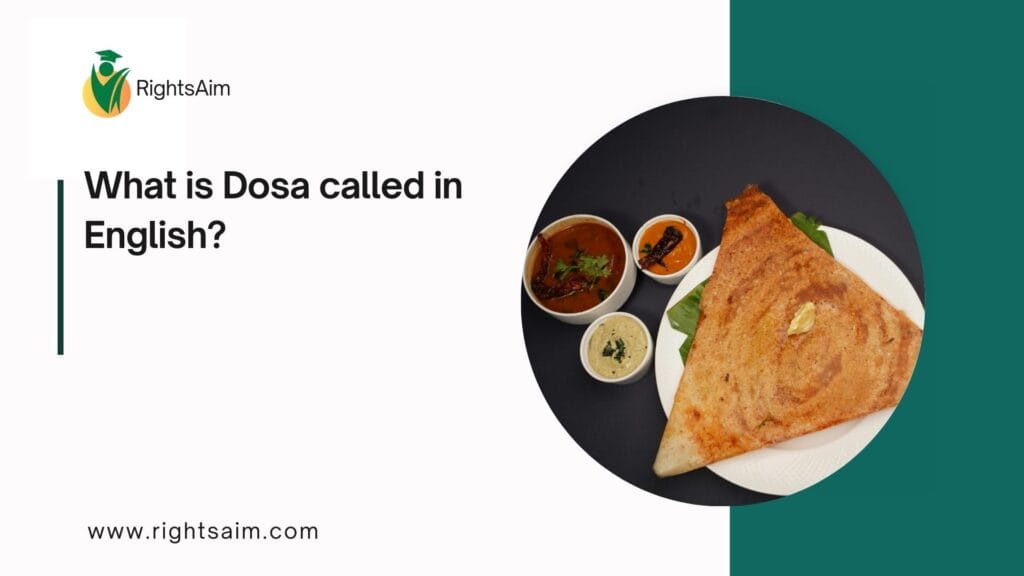
Dosa in English: Dosa is one of the most famous dishes from South India, but today it is loved across India and the whole world. In English, dosa is often called an “Indian pancake” or a “crispy pancake”. It is made using a fermented batter of rice and lentils, spread thin on a hot pan, and cooked until golden and crunchy. Unlike sweet pancakes found in the West, dosa is savoury and usually paired with chutney and sambar. This makes it both unique and healthy. Keep reading more about dosa.
Table of Contents
1. What is Dosa in English?
Dosa, also called Dosai, is a crispy Indian pancake or crepe made from a fermented batter of rice and urad dal (black gram lentils). In English, it is often described as:
“Indian rice pancake”
“crispy lentil crepe”
“South Indian breakfast pancake”
While in India the term “Dosa” itself is widely recognized, for global audiences it’s easier to explain it as a savory rice and lentil pancake served with chutney and sambar.
2. Origin and Cultural Significance of Dosa
Dosa is believed to have originated in South India, particularly Tamil Nadu and Karnataka, over a thousand years ago.
It is a staple breakfast dish across India, and now enjoyed worldwide.
Today, dosa has crossed borders and is served in restaurants in the USA, UK, Canada, Australia, and even Middle East countries.
3. Different Types of Dosa Explained in English
👉 Masala Dosa
Stuffed with spiced mashed potatoes, onions, and curry leaves. Often served with coconut chutney and sambar.
👉 Rava Dosa
Made with semolina (rava/sooji) instead of rice batter. Quick to prepare and very crispy.
👉 Onion Dosa
A variation of plain dosa topped with finely chopped onions, green chilies, and coriander leaves.
👉 Cheese Dosa
A modern version where grated cheese is spread inside dosa, loved by kids.
👉 Plain Dosa
Simple crispy dosa without stuffing. Ideal for dipping in chutneys.
👉 Set Dosa
Thick, soft, and fluffy dosas served in a set of 3, usually with vegetable curry.
4. Dosa Recipe in English (Step by Step)
Ingredients:
2 cups rice
1 cup urad dal (black gram)
1 tsp fenugreek seeds
Salt (to taste)
Oil or ghee (for cooking)
Method:
Soak rice, urad dal, and fenugreek seeds separately for 6–7 hours.
Grind them into a smooth batter and mix well.
Allow the batter to ferment overnight (8–10 hours).
Add salt and mix again before making dosa.
Heat a flat pan, pour a ladle of batter, and spread into a thin circle.
Add a few drops of oil and cook until golden brown.
Serve hot with chutney and sambar.
5. Chutney and Sambar Pairing with Dosa
Coconut Chutney – traditional and most popular.
Tomato Chutney – tangy and spicy.
Onion Chutney – adds a bold flavor.
Sambar – a spicy lentil soup made with vegetables.
6. Health Benefits of Eating Dosa
Rich in carbohydrates and proteins.
Naturally gluten-free.
Easy to digest because of fermentation.
Low in fat when cooked with minimal oil.
Can be made healthy with oats, ragi, or millet variations.
7. Interesting Facts about Dosa
Dosa is recognized as one of the world’s oldest fermented foods.
The Guinness World Record for the largest dosa is 53 feet long!
Dosa is so popular that “World Dosa Day” is celebrated by food lovers.
8. FAQs on Dosa in English
Q1. What is Dosa called in English?
👉 Dosa is called an Indian pancake or crispy crepe made from rice and lentils.
Q2. Is dosa healthy for weight loss?
👉 Yes, plain dosa is low in calories and good for weight loss when eaten with light chutney.
Q3. What is the difference between dosa and pancake?
👉 Pancakes are sweet and made from flour, while dosa is savory and fermented using rice and lentils.
Q4. Can dosa be eaten daily?
👉 Yes, dosa is safe to eat daily as it is light, nutritious, and easy to digest.
Q5. Which country is dosa from?
👉 Dosa originated in India (South India) but is now popular worldwide.
